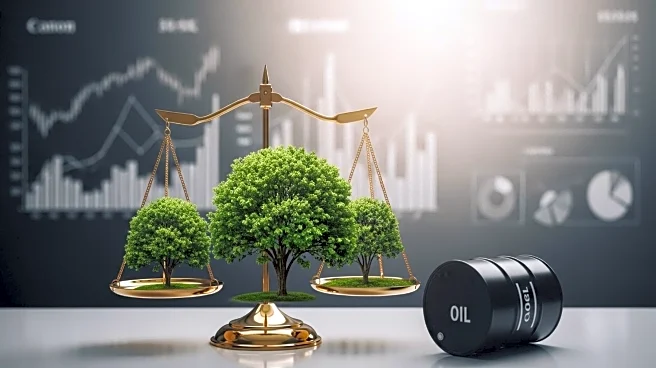What's Happening?
Finance Watch has released a report highlighting the significant exposure of banks to fossil fuel assets, estimated at over $1.6 trillion. The report suggests that banks are mispricing these assets, which could lead to a financial crisis similar to the 2008 subprime mortgage collapse. Julia Symon, Head of Research and Advocacy at Finance Watch, emphasized the risks posed by the mispricing of fossil fuel loans, which continue to finance the industry and exacerbate the climate crisis. The report proposes a climate systemic risk buffer as a solution, which would provide banks with a dedicated cushion against fossil fuel losses, thereby protecting the financial system and taxpayers from potential crises. This buffer could be implemented at EU banks without affecting their ability to lend to the real economy.
Why It's Important?
The mispricing of fossil fuel assets poses a significant risk to the financial system, as it could lead to a sudden market correction triggered by policy shifts or major climate events. Such a correction would have widespread implications, potentially affecting citizens and the broader economy. The proposed climate risk buffer aims to mitigate these risks by encouraging banks to account for climate-related systemic risks more accurately. This initiative is crucial as it seeks to prevent a disorderly transition to a green economy, which could result in substantial losses for the banking sector. By addressing these risks, the buffer could enhance the resilience of banks and contribute to a more stable financial system.
What's Next?
The report calls for policymakers to take immediate action to incorporate climate risks into banks' internal models. The European Central Bank has already warned about the potential losses for banks due to exposures related to high-emission firms. As the climate crisis continues to unfold, the urgency for implementing measures like the climate risk buffer increases. Policymakers and financial institutions will need to collaborate to ensure that these risks are adequately addressed, preventing a potential financial crisis and supporting a smoother transition to a green economy.
Beyond the Headlines
The proposal for a climate risk buffer highlights the ethical responsibility of financial institutions to consider the environmental impact of their investments. By addressing the mispricing of fossil fuel assets, banks can play a pivotal role in accelerating the transition to sustainable energy sources. This shift not only aligns with global climate targets but also reflects a growing awareness of the long-term economic benefits of sustainable practices. The initiative underscores the need for a systemic change in how financial risks are assessed, promoting a more responsible and forward-thinking approach to banking.









